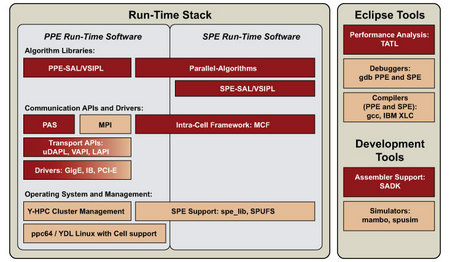SDK aims Playstation3 clusters at HPC apps
Aug 3, 2007 — by LinuxDevices Staff — from the LinuxDevices Archive — views Mercury Computer Systems has ported its multi-core software development kit (SDK) to Sony's Playstation3 gaming console. The company said its “MultiCore Plus SDK for PS3 — Base Package” lets developers exploit the PS3's powerful Cell processor for general-purpose, low-cost,… high-performance computing (HPC) applications.
Mercury Computer Systems has ported its multi-core software development kit (SDK) to Sony's Playstation3 gaming console. The company said its “MultiCore Plus SDK for PS3 — Base Package” lets developers exploit the PS3's powerful Cell processor for general-purpose, low-cost,… high-performance computing (HPC) applications.
Mercury originally shipped its MultiCore Plus SDK about a year ago, with initial support for Mercury's own Cell-based computers and blades, which target HPC applications like oil and gas exploration, university research, and financial modeling. The SDK includes Terra Soft's Yellow Dog Linux implementation for Cell-based systems, and is designed to enhance IBM's free SDK for the Cell architecture. The SDK comprises optimized math libraries and a graphical IDE and debugger based on Eclipse, along with Mercury's Trace Analysis Tool and Library (TATL).

MultiCore SDK architecture
(Click to enlarge)
Kai Staats, CEO of Terra Soft, stated, “We've seen a tremendous amount of interest in leveraging the PS3 as a Cell development system and as a compute node for lightweight, high-performance clusters.”
Joel Radford, VP of corporate marketing at Mercury, added “Customers who choose to start out with the PS3 can later migrate seamlessly to more sophisticated hardware solutions from both Mercury and IBM.”
Mercury shipped the first available Cell-based computer, and recently collaborated with IBM on Cell-based computing blades.
Availability
Mercury's “MultiCore Plus SDK for PS3 — Base Package” is available now, priced at $400 per license seat. It will be distributed by Terra Soft. Mercury will demonstrate the tools at the SIGGRAPH trade show, Aug. 7-9 in San Diego.
This article was originally published on LinuxDevices.com and has been donated to the open source community by QuinStreet Inc. Please visit LinuxToday.com for up-to-date news and articles about Linux and open source.